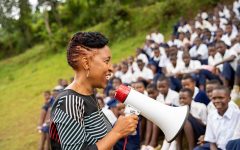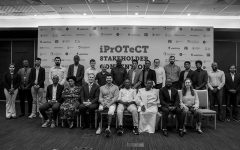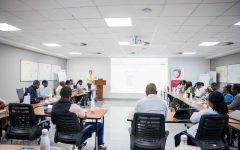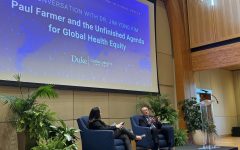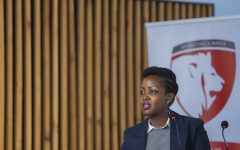Changing the World by Challenging It: UGHE Celebrates International Women’s Day
March 8, 2021 2021-03-08 9:32Changing the World by Challenging It: UGHE Celebrates International Women’s Day
A challenged world is a changing world. This year’s International Women’s Day, set against the backdrop of COVID-19’s devastating burden of women, brings with it a new message; that of the urgent need for a shift change in the status of women globally. The global gender agenda has taken a significant backstep during the global pandemic. In 2019, the figures looked encouraging for an upward trajectory in cross-sector gender equity; large gains were observed in female labour force participation, educational attainment gaps narrowed (with 35 countries achieving full parity), and decreasing rates of maternal mortality ratio by 38% worldwide.
Now, in 2021, we are looking at a very different picture. COVID-19 related spikes in unemployment have had devastating outcomes for the high percentage of women working in informal sectors, critical funding for maternal health services have been reallocated to COVID response and relief efforts, and rates of gender based violence have soared as a direct correlation with enforced lockdown measures confining women in the home with potentially abusive partners.
This is why this year’s International Women’s Day theme – #ChooseToChallenge – is so very critical. This means having the confidence and impetus to call out gender bias and inequality, to use your platforms to seek out and celebrate women’s achievements and, in doing so, push for an inclusive world.
And whilst #ChooseToChallenge puts emphasis on personal commitments towards gender equity, we should also acknowledge solidarity as central to advancement in this area – not only between female leaders, learners and changemakers, but via meaningful collaboration with our male allies. Unless men become advocates for female empowerment, and start to proactively identify ways to elevate the voices of their female colleagues and communities, it will be impossible to shift the dial towards a more gender equitable world in the future.
This is why all students at UGHE – both male and female – are taught to identify, analyse and act on historical, cultural and gender biases across global health systems. This holistic educational approach includes a Gender and Social Justice for UGHE’s medical students, and training in leadership and communication to equip students to challenge the status quo, voice the historically unvoiced, and fight for gender equity at the systems level.
Organizations also have a role to play in championing gender equity. Spearheaded by its Center for Gender Equity, UGHE’s ambitious gender agenda looks inwards also, with equity and diversity training rolled out amongst staff, students and faculty, alongside a first-of-its-kind Gender and Diversity audit, developed through a participatory four-part methodology, analysing gender sensitivity and mainstreaming within academic activities, student and community engagement projects, organizational culture and practices and, in the near future, supporting external organizations build gender and diversity inclusiveness in their operations.
To celebrate International Women’s Day we spoke to MGHD’17 alumni, Denise Uwera, and current UGHE student Gloria Rukomeza to hear firsthand from two female changemakers in health. Whilst from different countries and career stages, they have a shared commitment to advancing gender equity in their respective fields, and a shared pride in being a woman in global health now and for the future.
Gloria Rukomeza, MGHD ‘21
I, like many other kids I know, had a big dream. When I was ten, I dreamt I’d someday be able to save people’s lives. During that time, I thought only doctors had that power. I knew that to succeed, I needed to keep growing this dream in mind. I grew up in the Eastern part of the Democratic Republic of Congo and, as my neighborhood was only surrounded with social sciences schools, to find a high school specialized in sciences was very hard for me. I knew I needed to travel to find such opportunities elsewhere, but being born into a poor family was a barrier to choice. I remember so clearly my sister saying to me, ‘Gloria, there’s no other choice, you can do well in social studies so commit to that’, and whilst I knew she was right, I felt wretched that I was unable to live out my dream in global health. After high school, my family could no longer afford to continue supporting my studies and I spent two years figuring out my next chapter. I was awarded a scholarship opportunity at the Kepler program in Rwanda, the start of a transformative life, and most recently, was admitted to UGHE’s MGHD program.
Being a woman in the field of health and science aligns with my desire to make changes in the world. By putting their efforts, their courage, and their voices together, women are driving real-world, inclusive changes in how health is delivered around the world, regardless of where they have started out from. The contributions of women matter a great deal in fighting health inequalities within communities. With the increase in global disease burden, educating the young generation, especially women is the most important thing. Through the MGHD program at UGHE, I am learning a lot about global health issues stemming from different systemic forces, inequities, and inefficiencies in health care delivery. It reminds me of my experiences as a child spending the whole day at a health center with my mom where often we would wait for so long we ended up going back home without accessing care because the nurse was unable to serve everyone. I’m passionate about using my voice and my acquired skills through the MGHD to address barriers to healthcare like this.
People used to say, “educating a woman is educating a community”. It’s true. Equipped with the needed skills and expertise from the MGHD program, my goal is to give back to the community by sharing my knowledge with other young African women through educational programs. Women should be given the chance to express themselves, to believe in themselves, and use their gifts to contribute to positive change. Despite the hardships I endured during adolescence, I was inspired by the strong ladies challenging the status quo in global health. During the Women Leaders in Global Health’s 2019 conference, I remember Prof. Agnes Binagwaho (UGHE Vice Chancellor) highlighting how the participation of women in health leadership is critical to improving health for all. I totally agree, and my main objectives since hearing this have been to advance the status of women as I grow in my future career. What I would say to young girls like I was, looking to get into science and health, is don’t let your dream die inside you. Believe in your potential, and seek support from role models and mentors. It is not easy for countries to achieve their true scientific potential with a highly skewed gender ratio in health.
Denise Uwera, MGHD ‘17, Nutrition Specialist, UNICEF
My career in global health started out in 2006 when I was working with IMB Rwanda, specifically in decentralized level health services in different districts. I chose a masters at UGHE to extend my knowledge in global health, and as a way of better understanding what was actually happening on the ground level. I felt I was lacking the hands-on practical experience of health delivery, as well as an understanding of the root causes of health issues.
As a global community, we face so many social injustices and disparity in access to health services. Even before COVID, we were still struggling to provide equitable services. As a woman working in the humanitarian service delivery sector (at UNICEF Rwanda), I’ve been acutely aware of the fact that women and children have always borne the greatest burden of health crises like the current pandemic. This links to multiple factors, but mainly to poverty. It’s unfortunate these issues still exist in today’s world, but they do. The economic and social consequences associated with the pandemic have terrible ramifications on the women and children of our country. We have higher numbers of malnourished children, higher numbers of those suffering deprivation; deprivation in education, health, and the social services often provided, yet not accessed easily by the most vulnerable.
The time is now for collaboration on every level – everyone needs to play their role. UGHE is doing an amazing job of fighting to end inequities in health through education, but they cannot do this alone. We as women in global health, especially as leaders in our fields, are in a position to do a lot – to break social barriers and advocate for more equitable care. It’s clear from my time at UNICEF, that our fellow women and girls, those most affected, need us, and they need our voices. We need to team up and fight as women, and we need the support from our male allies too.
My advice to young girls starting out in careers in science and health is to stay committed. I got pregnant right after we started the program at UGHE, and to continue studying, I had to work doubly as hard. I knew I was going to gain a lot – in getting hands on skills and understanding – which, ultimately would set me apart. My supervisor at UNICEF told me I had been transformed after the MGHD program- in my understanding, thinking, ways of finding solutions, and strategic thinking. Not only this but critically it helped me unlock my full potential as a woman and gave me the confidence needed to challenge the status quo. UGHE is an incredible program for all – but especially women like me who are ambitious to affect change and advance their careers in global health. Education breaks barriers – it is the best way to reverse gender and social norms.
***
Hear the #ChooseToChallenge personal commitment of our diverse Lion Pride in our International Women’s Day video here.



